University of Minnesota faculty members are concerned about the Administrative Hiring Task Force.
Provost Rachel Croson charged the task force to document and clearly explain the current hiring authority for center director positions at the University, without inclusion of academic freedom.
The executive committee of the University’s chapter of the American Association of University Professors wrote to the task force asking members to resign.
The task force, announced in July 2024 and officially charged on Nov. 25, 2024, was established in direct response to the job offer to Raz Segal was rescinded after he said Israel’s military campaign in Gaza was “textbook genocide.”
The College of Liberal Arts interim Dean Ann Waltner offered Segal an academic position in the History department and a directorship position, as per CLA constitution’s hiring policy. Former Interim President Jeff Ettinger rescinded the offer.
Former task force member Steven Ruggles said he disagreed with the decision.
“It seems to me that presidents shouldn’t get involved,” Ruggles said. “The idea that we’re going to be scared, that we can’t have somebody in that kind of position who is an expert on genocide and Holocaust studies, I mean that’s what the center does.”
Willam Jones, the American Association of University Professors (AAUP) University chapter president, said every position at the University requires academic freedom as a protection, including directorships.
“It’s not simply an administrative position, but it’s an academic position. And therefore academic freedom is really important for that position,” Jones said. “The Center of Holocaust Studies considers really controversial and difficult questions.”
In a letter to task force members, the AAUP said the task force fails to “encompass the central issue of academic freedom.” Jones said he is deeply concerned that the task force may ignore this concept.
“It’s a little bit puzzling. The goals shifted somewhat, and it wasn’t clear why that happened,” Jones said. “I suspect that it happened because if it was going to take on academic freedom, then it would have a much bigger charge.”
Despite no direct reference to academic freedom in the charge, Task Force Chair William McGeveran said it is still a part of the work being done.
“A lot of the policies that we’re looking at have components in them, including our tenure policy,” McGeveran said. “It’s naturally coming to be part of the conversation when you assess the landscape. So it is coming up and it’s being discussed.”
Croson’s involvement in this committee is also alarming to some faculty members. She received a vote of no confidence in the CLA assembly in June. Michael Gallope, the vice-chair of the CLA Assembly, was pivotal in the no-confidence vote.
“This doesn’t make any sense. If someone is the recipient of a no-confidence vote from the Senate because of something they did, it is improper for this individual to subsequently appoint a handpicked committee to reconsider what the Senate already deliberated,” Gallope said.
Gallope said the issue surrounding administrative hiring is crucial and is concerned the task force will not be thorough enough.
“You can’t run a University if you are afraid of disagreement or controversy. It just doesn’t work,” Gallope said.
There is concern that this task force should have been created in the University Senate through one of the numerous standing committees. McGeveran said because the task force’s charge is so specific, its role takes place outside of shared governance.
“It’s meant to be an opportunity to interpret the existing policy, it’s not writing any policies, but interpreting,” McGeveran said. “Shared governance is where you assess policies and change them. That’s not what we’re doing. This task force isn’t organized to make decisions.”
Despite that, former member Ruggles chose to step down from the committee on Jan. 13 over concerns of overstepping shared governance.
“I am persuaded by the argument that the task force undermines the University’s system of shared governance,” Ruggles said. “The task force is an ad hoc arrangement that bypasses the Faculty Senate and the Senate Committee on Faculty Affairs.”
The task force was charged to provide a report by March. McGeveran said that is still the goal.


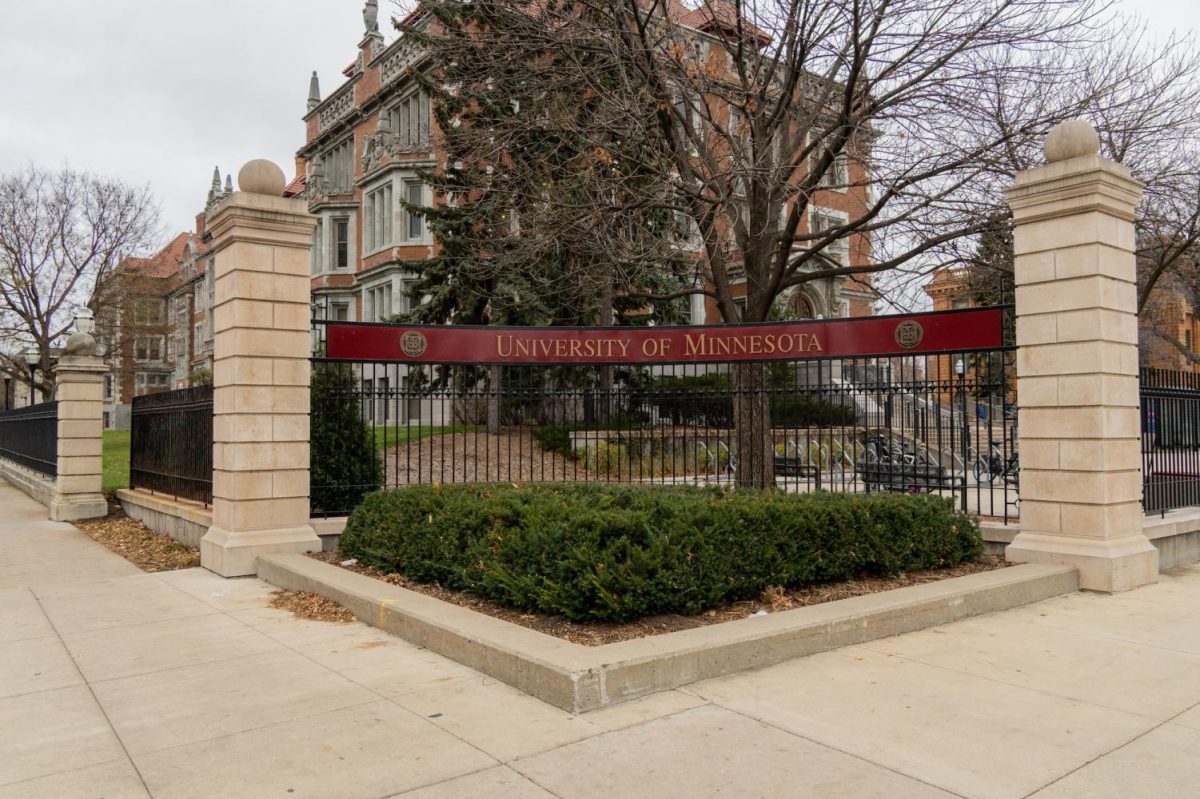
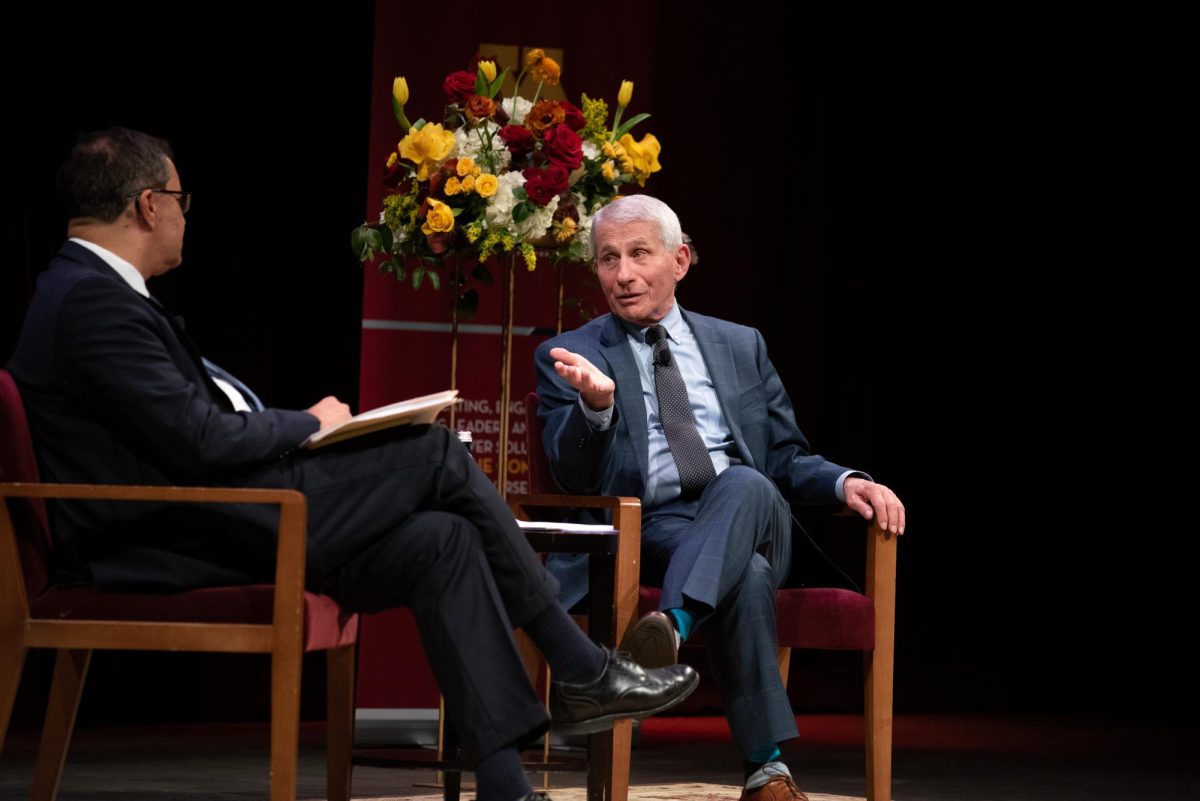







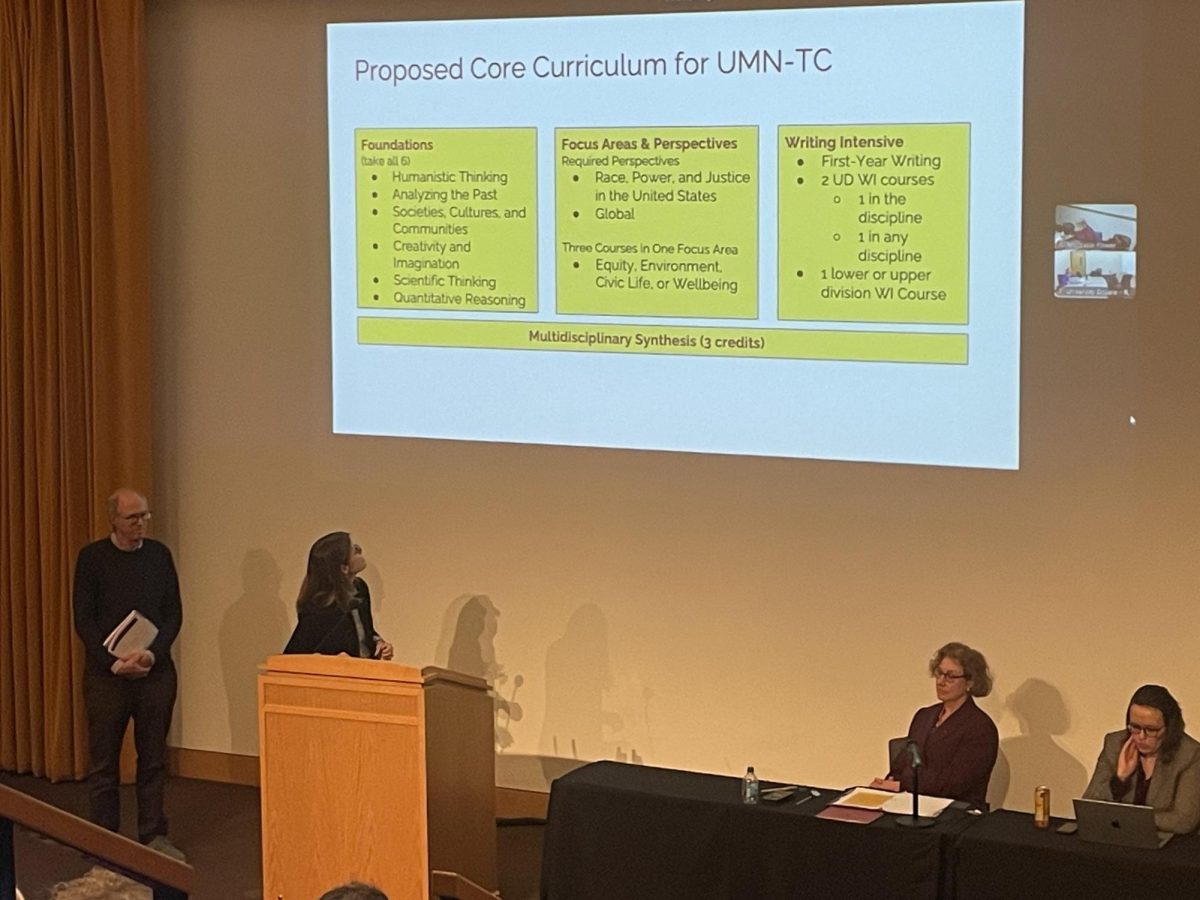
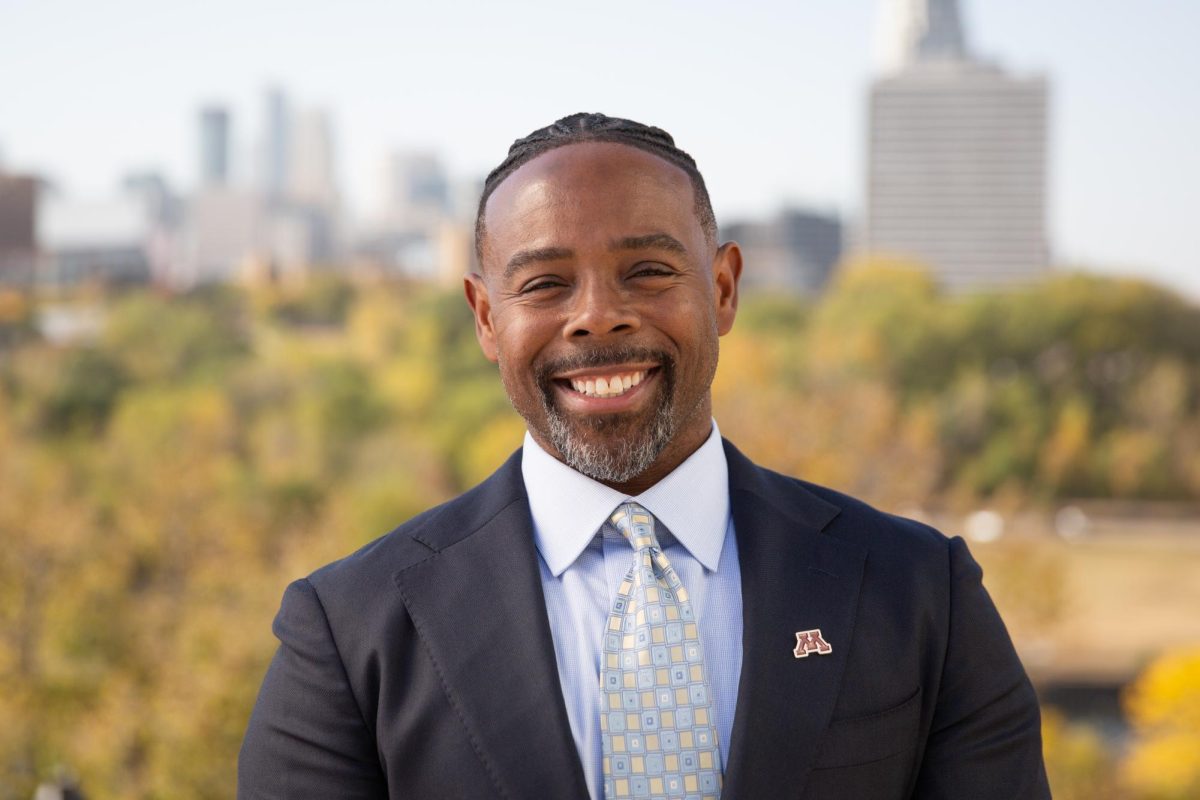
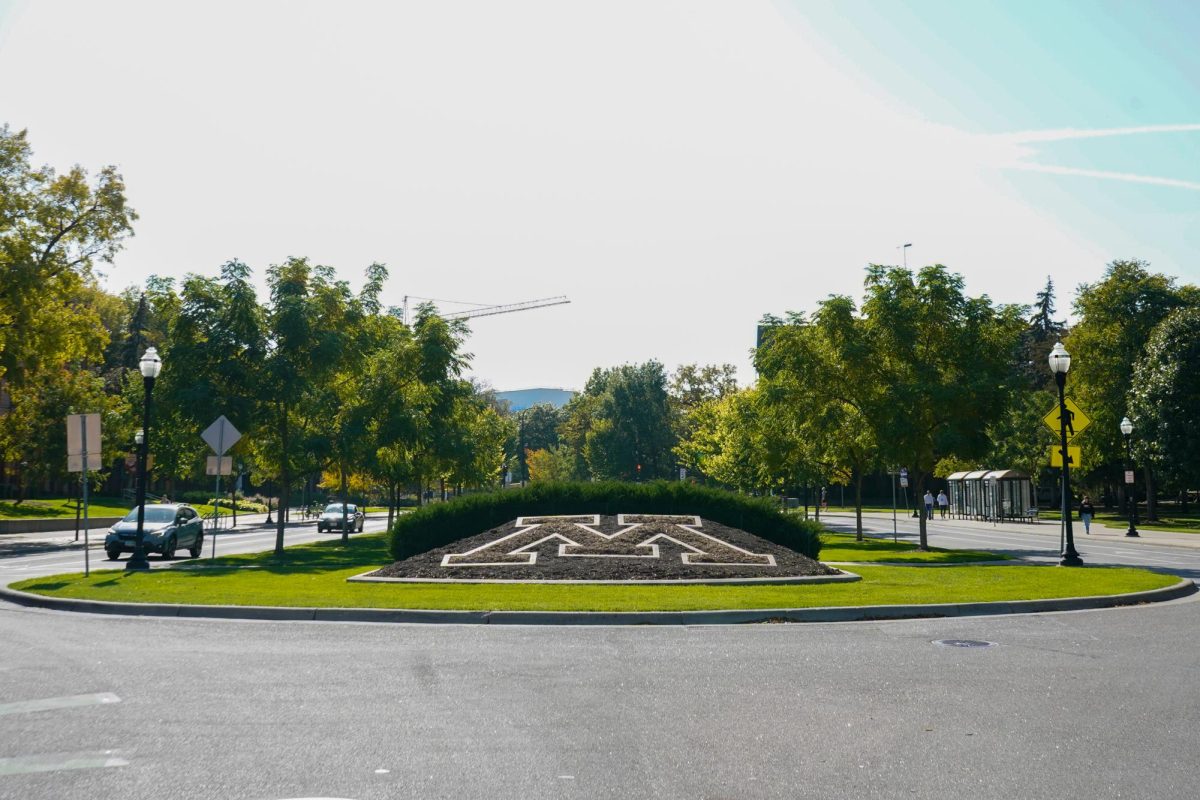

KG
Feb 7, 2025 at 12:35 pm
Bumpy is still bumping along—good old copy-and-paste tactics. Is that how you’ve managed to pass your courses? Don’t bother thinking, just copy. Nothing original, nothing new, just the same tired repetition. If you’re truly interested in understanding who is responsible for the death and destruction in Gaza, why not listen to what actual Palestinians are saying? Not your wannabe Palestinian friends, but those living in Palestine.
Consider the words of PA Chairman Abbas’ Advisor Mahmoud Al-Habbash: “The Palestinian people did not want October 7, [2023] (i.e., Hamas’ massacre), and it was not consulted about Oct. 7.” And the official PA daily Al-Hayat Al-Jadida stated on June 22, 2024: “The Hamas leaders view the [Palestinian] victims of their hopeless policy as a project of ‘human sacrifices’ permitted for slaughter when and how they want. Not only that, they also dedicate the blood of these Palestinian human sacrifices … to their Persian [Iranian] masters, in order to ensure monetary liquidity.”
Hamas terrorists clearly are responsible for the devastation. That is the truth.
bumpy
Feb 5, 2025 at 7:47 am
Excellent, factual article. The University should not be in the habit of appointing ad hoc, hand-selected task forces of faculty members just because the democratically-elected committees of the standing faculty governance structure won’t give the administration the answers it wants. Contrary to Professor McGeveran’s assertion, elected committees like the Academic Freedom and Tenure Committee are precisely empowered to conduct the sort of review he sees as, for whatever reason, uniquely the task force’s purview. The real reason for this task force is that the faculty governance structure has been consistent in its ruling that blocking Raz Segal’s hire violated standing constitutional procedures of the College of Liberal Arts and Board of Regents. This is why the Faculty Senate overwhelmingly no-confidence in Ettinger’s and Provost Rachel Croson’s leadership. The administration presumably wants a report from the task force that provides some sort of constitutional interpretation that grants legitimacy for the President and other administrators to block faculty hires. They know they won’t get it from the Faculty Senate, so the task force is a ploy to advance the administration’s interests through the facade, but not the fact, of shared governance.
This claim is valid whether anyone bumps it or not. Truth does not require belief, after all. You’re the one applying a settler-colonialist theory to what is happening in Gaza. The rest of us just want the death and destruction to stop. As a wannabe scholar, this might be hard or impossible for you to understand.
Keep working on being a better relative, KG.
KG
Feb 4, 2025 at 4:39 am
Bump, bumping the same claims multiple times won’t make them valid. UMN hiring procedures assumed transparency and honest candidate evaluation by UMN faculty committed to academic excellence. Instead, a clique of anti-Israel faculty ganged together to pressure others into the appointment of a marginal academic (Ziv Segal) to CHGS director only because he was similarly, rabidly anti-Israel. This group—composed of Faculty for Justice in Palestine (FJP/FLAGSJP), their allies and others swayed by them—undermined the integrity of the hiring process and tarnished UMN’s reputation. Hopefully, such a distorted hiring process will not be repeated.
Dear student, this directly impacts you and your education. Do you want to be presented with biased narratives (like applying settler-colonialist theory to Israel-Palestine) or do you want to hear why Jews are the indigenous people of Israel-Palestine. Jews have maintained a continuous presence in the region for thousands of years, and it is backed up by a wealth of historical documentation and archeology that existed even before anyone was calling themselves Palestinian. You deserve to hear the evidence,
Consider also: Do you want your professors to avoid certain topics because they fear backlash from biased colleagues? Do you want faculty members dedicating their time to disruptive campus activism instead of teaching or conducting research, thereby diminishing your academic experience? Do you want students to face threats, intimidation, and bullying? Do you want more incidents like the Morrill Hall takeover, campus encampments, or building closures?
These are crucial questions to reflect on. Once you have, ask yourself whether the time has come to reconsider the influence of FJP at UMN and to advocate for a more balanced, academically rigorous environment.
bump
Feb 3, 2025 at 3:23 pm
Excellent, factual article. The University should not be in the habit of appointing ad hoc, hand-selected task forces of faculty members just because the democratically-elected committees of the standing faculty governance structure won’t give the administration the answers it wants. Contrary to Professor McGeveran’s assertion, elected committees like the Academic Freedom and Tenure Committee are precisely empowered to conduct the sort of review he sees as, for whatever reason, uniquely the task force’s purview. The real reason for this task force is that the faculty governance structure has been consistent in its ruling that blocking Raz Segal’s hire violated standing constitutional procedures of the College of Liberal Arts and Board of Regents. This is why the Faculty Senate overwhelmingly no-confidence in Ettinger’s and Provost Rachel Croson’s leadership. The administration presumably wants a report from the task force that provides some sort of constitutional interpretation that grants legitimacy for the President and other administrators to block faculty hires. They know they won’t get it from the Faculty Senate, so the task force is a ploy to advance the administration’s interests through the facade, but not the fact, of shared governance.
KG
Feb 3, 2025 at 10:38 am
The UMN administration is committed to maintaining UMN as a leading institution of learning, prioritizing the interests of the university as a whole. In contrast, a large group of CLA faculty with strong anti-Israel views has been influencing hiring practices to advance a specific political agenda. These faculty members adhere to the false settler-colonialist narrative regarding Israel and Palestine, and key members of Faculty for Justice in Palestine (FJP/FLAGSJP at UMN) have embedded themselves within various UMN departments and UMN AAUP. The events following the October 7, 2023, attack on democratic Israel by terrorist Hamas illustrate this tension. While democratic Israel was the target of this terrorist assault, CSCL, GWSS, and AIS issued statements critical of Israel in the months that followed.
The CHGS director hiring process lacked transparency and did not include consultation with senior CHGS faculty. There was an attempt to ram through the appointment of Raz Segal, a marginal academic and divisive anti-Israel figure. When CHGS faculty threatened to resign, the university rescinded the offer to Segal, highlighting concerns about bias and integrity in the hiring process.
The influence of FJP/FLAGSJP on campus has been linked to heightened tensions. A study by the AMCHA Initiative, which surveyed 700 colleges and universities showed that campuses with an FJP presence are significantly more likely to experience physical assaults on Jewish students, threats of violence, and prolonged protests. Additionally, FJP faculty reportedly allocate 9.5 days to protests— which detracts from their teaching and research responsibilities. At UMN incidents include threats and intimidation, shooting out Hillel’s windows last June, campus-wide disruptions, and the Morrill Hall occupation this year. These events underscore the broader challenges UMN faces in fostering a safe and inclusive campus environment for us all and a hiring process that ensures that we can attract the most competent faculty.
thank you fac sen
Feb 2, 2025 at 10:25 am
Just bumping this because it’s true:
Excellent, factual article. The University should not be in the habit of appointing ad hoc, hand-selected task forces of faculty members just because the democratically-elected committees of the standing faculty governance structure won’t give the administration the answers it wants. Contrary to Professor McGeveran’s assertion, elected committees like the Academic Freedom and Tenure Committee are precisely empowered to conduct the sort of review he sees as, for whatever reason, uniquely the task force’s purview. The real reason for this task force is that the faculty governance structure has been consistent in its ruling that blocking Raz Segal’s hire violated standing constitutional procedures of the College of Liberal Arts and Board of Regents. This is why the Faculty Senate overwhelmingly no-confidence in Ettinger’s and Provost Rachel Croson’s leadership. The administration presumably wants a report from the task force that provides some sort of constitutional interpretation that grants legitimacy for the President and other administrators to block faculty hires. They know they won’t get it from the Faculty Senate, so the task force is a ploy to advance the administration’s interests through the facade, but not the fact, of shared governance.
KG
Feb 1, 2025 at 6:32 am
Demi, I see that it’s a little difficult for you to think about, history, facts and reality. And there really isn’t much to take away form your comments.
Demi
Jan 30, 2025 at 6:32 am
That’s your take away from my comment, KG?
That potato salad must have you sleepy.
KG
Jan 29, 2025 at 9:44 am
Demi, based on your comment, I gather you’re taking a course that discusses the settler-colonialist narrative. It’s important to note that Jews have lived continuously in the Israel-Palestine region for thousands of years, spanning ancient times, the Middle Ages, and into the modern era. For example, Benjamin of Tudela, a 12th-century Jewish traveler, documented dozens of Jewish communities throughout the region during his visit.
You might consider asking your professor what they think about this historical evidence, because it seems to suggest that the Jews are the indigenous people of Israel-Palestine. Feel free to share their response—I’ll be here to discuss further. And, BTW, the potato salad was yummy.
KG
Jan 28, 2025 at 3:53 pm
Grad, we are waiting to hear your fantastic news.
Demi
Jan 28, 2025 at 12:27 pm
KG is that loony relative everyone tolerates out of familial obligation.
He proudly spouts his crazy, you pass him the potato salad.
Grad
Jan 27, 2025 at 7:27 pm
KG, if your concern is an atmosphere of ideological conformity in favor of the Palestinian cause anywhere at the U, I have some fantastic news about the status quo for you. Fantastic for you, anyway.
faculty senator
Jan 27, 2025 at 11:53 am
Excellent, factual article. The University should not be in the habit of appointing ad hoc, hand-selected task forces of faculty members just because the democratically-elected committees of the standing faculty governance structure won’t give the administration the answers it wants. Contrary to Professor McGeveran’s assertion, elected committees like the Academic Freedom and Tenure Committee are precisely empowered to conduct the sort of review he sees as, for whatever reason, uniquely the task force’s purview. The real reason for this task force is that the faculty governance structure has been consistent in its ruling that blocking Raz Segal’s hire violated standing constitutional procedures of the College of Liberal Arts and Board of Regents. This is why the Faculty Senate overwhelmingly no-confidence in Ettinger’s and Provost Rachel Croson’s leadership. The administration presumably wants a report from the task force that provides some sort of constitutional interpretation that grants legitimacy for the President and other administrators to block faculty hires. They know they won’t get it from the Faculty Senate, so the task force is a ploy to advance the administration’s interests through the facade, but not the fact, of shared governance.
KG
Jan 27, 2025 at 6:00 am
The issue is whether “academic freedom” means that a clique of professors can impose ideological-political conformity on hiring new UMN faculty, especially new faculty with additional managerial responsibilities (such as center directors). In Raz Segal’s case, a clique of extremist pro-Palestinian faculty–proponents of the false Israel-Palestine settler-colonialist narrative—tried to ram through their preferred candidate. Raz Segal is a marginal academic and has a temperament and biases that make him unsuitable for CHGS director. Hiring Raz Segal would have made UMN a laughingstock. Fortunately, the hiring process was terminated. UMN AAUP is simply a vested interest here at the university. Faculty for Justice in Palestine, with members across various UMN departments and in UMN AAUP, is another vested interest. Michael Gallope is one of FJP’s prominent voices.
A key responsibility of UMN’s administration is to ensure the institution’s growth in quality and reputation as a leading center for learning and scholarship. When particular faculty factions attempt to prioritize political or ideological agendas in hiring decisions, it becomes imperative for the administration to step in and safeguard the university’s broader mission.